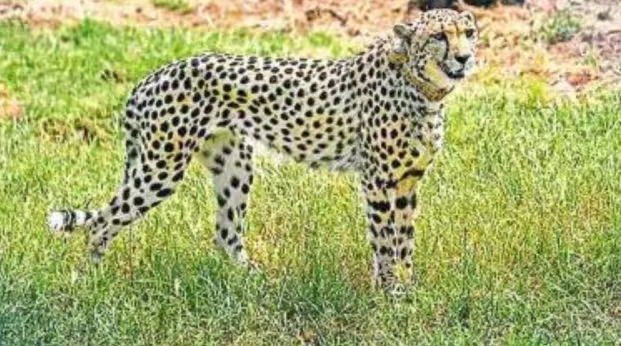Project Cheetah Audit Flags Concerns (GS Paper 2, Governance)

Context
- A recent report by the Accountant General of Madhya Pradesh has raised significant concerns regarding the management of Project Cheetah in Kuno National Park.
- The audit highlights issues related to coordination between central and state government departments, casting doubt on the effectiveness of the project aimed at reintroducing cheetahs to India.
What is Project Cheetah?
Project Cheetah is India's ambitious initiative to reintroduce cheetahs, which were declared extinct in the country in 1952. The project plans to import 50 cheetahs over five years to various national parks across India.
- Relocation Process:
- In September 2022, the first batch of eight cheetahs arrived from Namibia.
- A second batch of 12 cheetahs was imported from South Africa in February 2023.
This project marks a significant moment in wildlife conservation, being the first instance of relocating a large carnivore from one continent to another.
Current Status
- As of now, 20 adult cheetahs have been introduced in Kuno National Park.
- Unfortunately, the project has seen challenges, including the death of eight adult cheetahs (three females and five males) since their arrival.
- However, the project has seen some success, with 17 cubs born, of which 12 have survived, bringing the total to 24 cheetahs in the park.
Concerns Raised in the Audit
The audit report has flagged several critical issues:
Lack of Documentation:
- There was no mention of cheetah reintroduction in the work and management plans.
- The report indicates a lack of clarity about where and how the reintroduction work commenced.
Financial Irregularities:
- From 2021-22 to January 2024, ₹44.14 crore was spent on the project, but much of this expenditure did not align with the approved management plan.
- An unjustified expenditure of over ₹90 lakh was identified under labor costs, where machines were used instead of employing local manual labor, leading to increased costs and a loss of employment opportunities for local workers.
Involvement of Ground Staff:
- The audit revealed that the ground staff and the Kuno Wildlife Division were not involved in crucial decisions such as site selection and cheetah reintroduction studies, raising concerns about planning and coordination.
Focus on Asiatic Lions:
- Kuno Wildlife Sanctuary was designated as a potential second habitat for Asiatic lions, alongside the Gir forest in Gujarat.
- However, there have been no efforts made to initiate the reintroduction of Asiatic lions.
Training and Expertise:
- The former Divisional Forest Officer (DFO) received training in South Africa and Namibia for cheetah management but was transferred shortly after, rendering his expertise unavailable for the project.
- The audit deemed this expenditure wasteful, as trained staff are expected to remain at conservation sites for a minimum of five years as per the Action Plan.
Kuno National Park Overview
- Location: Kuno National Park is situated in the Vindhyan Hills of Central India, within Madhya Pradesh.
- Establishment: Initially established as a wildlife sanctuary in 1981, it was designated a national park in 2018.
- Geographical Features: The park is traversed by the Kuno river, contributing to its rich biodiversity.
Conclusion
- The audit of Project Cheetah raises serious questions about the management and coordination of this high-profile wildlife conservation initiative.
- Addressing these concerns will be crucial for the project's success and for ensuring the sustainable reintroduction of cheetahs into their natural habitat in India.
- Strengthening coordination between central and state departments, ensuring proper documentation, and involving local expertise will be key steps in overcoming the current challenges.


